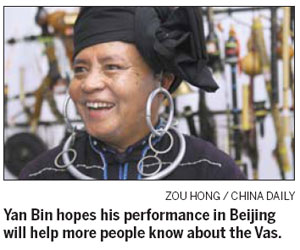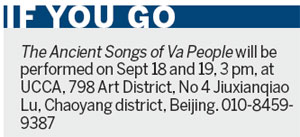Life and Leisure
Music in the key of life
By Chen Nan (China Daily)
Updated: 2010-09-14 08:03
 |
Large Medium Small |
Deep, resonating strings underscore the chanting as the music of a zither-like instrument weaves in and out.
The musicians wear black, short collarless jackets, loose trousers, black turbans and big silver earrings that sway back and forth as they play in front of changing background visuals.
The four musicians, of the Va ethnic group from Yunnan province, are rehearsing Ancient Songs of Va People, one of the five chapters of a multimedia show to be performed at the Ullens Center for Contemporary Art (UCCA), which is located in Beijing's 798 Art District, on Sept 18 and 19.

"It's so weird to have such a huge train out there. What's it for?" asks Yan Bin, 64, one of the Va musicians, referring to an ongoing exhibition by a young artist who moved a real train into one of the exhibition halls at UCCA.
Thanks to his family's long tradition of music, Yan, the son of a headman of a tribe in Ximeng Va autonomous county, in Pu'er city, was able to absorb a thorough knowledge of the ethnic group's music, especially the handmade instruments. "I have hundreds of instruments at home and the 47 I've brought here are just a small selection," Yan says.
"Here is a flute I made from a tree root. What makes it special is the strand of hair I tied to the end of the flute, which is from my late mother," Yan adds, holding up the flute.
Yan has been working for the Ximeng county culture department for over 30 years, specializing in recording the music of the Va ethnic group and collecting their musical instruments.
Yan and his elder brother Sui Ga have been enthusiastically dedicated to spreading traditional Va culture since 1997, when the late musician Tian Feng discovered them and invited them to form the first Va music class.
Yan says that he wants the current show to help people become more aware of Va ethnic culture, which honors family life, nature and a spiritual discipline based on responsibility.
"I felt like passing down the singing and dancing, just like letting my descendants remember my mother through the flute," Yan says.
"Singing and dancing can be seen everywhere in our culture. We sing and dance when anything happens, such as a birth, a marriage, a death, building a new house," says Na Huan, 60, a master of Va ethnic dancing who will also perform at the show in Beijing.
Yan Bin and Na Huan are members of the Yunnan Yuansheng Indigenous Music and Dance Studio, which now boasts over 100 master folk artists. They are not professional singers, musicians and dancers, instead they rely on farming and weaving to make a living.
There are 25 distinct indigenous peoples in Yunnan with hundreds of sub-branches and each of these people has their own unique social structures, ways of life, historical developments, customs and cultural arts, according to 40-year-old filmmaker, Liu Xiaojin, who has followed the artists for 10 years.
"They each have their own religious beliefs, way of life and fashions, which are highly valuable," Liu says.
In 2005, 11 members from the Yuansheng Indigenous Music and Dance Studio were invited to perform at the Kennedy Center for the Performing Arts in Washington DC and they then toured the cities of the east coast for a month, to great acclaim. This October, the artists will perform at Lijiang Snow Mountain Music Festival, in Yunnan.
However, they are concerned about the future of their traditional music, now that the younger generations all work in big cities.
"The young people are influenced by the outside world. They prefer rock 'n' roll to the traditional music," Liu says. "It's a pity."

The filmmaker has invited the older generation of artists to record their music for CDs and DVDs. Because they cannot use a computer and some of them cannot speak Mandarin, Liu and her team asked the old performers to tell their stories and the music traditions passed down from early generations while writing them down.
"It's lucky for us, who have been living in big cities, listening to their music and knowing their stories," Liu says.
China Daily